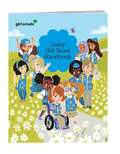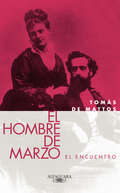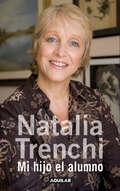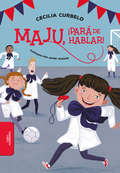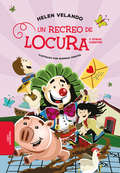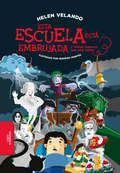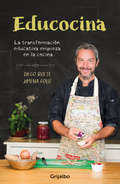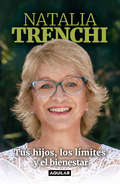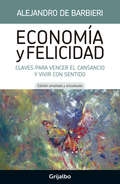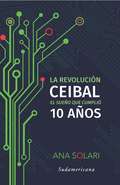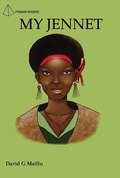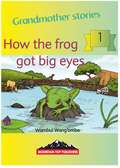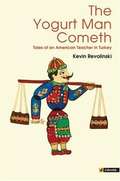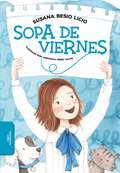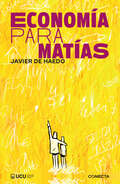- Table View
- List View
Intermediate First Year Telugu Textbook - Telangana Board
by Acharya Banna IlaiahThis is the presecribed text book for Telugu - Second language for the first year students of Telananaga board, Telugu Medium
Intermediate First Year Telugu Textbook - Telangana Board
by Acharya Banna IlaiahThis is the presecribed text book for Telugu - Second language for the first year students of Telananaga board, Telugu Medium
Mauritius ENGLISH Grade 7 - MIE
by Mauritius Institute of EducationENGLISH Grade 7 Textbook from Mauritius Institute of Education
Biology For Ethiopia Grade 8
by Anteneh Tesfaye Dereje Mergia (B.Sc M. A. Fekadu Worku Gessesse Assefa Abebe GetahunBiology Students Text Book Grade 8
Biology For Ethiopia Grade 7
by Anteneh Tesfaye Dereje Mergia (B.Sc M. A. Fekadu Worku Gessesse Assefa Abebe Getahun(Ph.DBiology For Ethiopia Grade 7 Students Text Book
Ethiopia Information communication technology Grade 10
by Saurabh Gupta Dixit J. B.Information communication technology grade 10 from Federal Democratic Republic of Ethiopia, Ministry of Education.
English for Ethiopia Grade 7
by Wagaba William Tarekegn Mekonnen Fekadu Mulugeta Tindikahwa EdwardEnglish for Ethiopia Gread 7 Students Text Book
Ethiopia Physics Student Textbook Grade 10
by Susan Gardner Catherine Gaunt Graham BonePhysics textbook from Federal Democratic Republic of Ethiopia Ministry of Education
Biology Student Textbook Grade 10 - Ethiopia
by Ann FullickBiology student textbook grade 10 by the federal democratic republic of ethiopia, ministry of education.
Civics And Ethical Education Student Textbook Grade 10
by Getaneh Mehari Mesfin Bogale Lakew Regassa Tewodros MekonnenCivics And Ethical Education Student Textbook Grade 10 by the federal democratic republic of ethiopia, ministry of education.
El Hombre de Marzo: El Encuentro
by Tomás De MattosLuego de más de dos años de gran dedicación, el escritor Tomás de Mattosle pone el cierre a esta obra fundamental sobre la vida de José PedroVarela. Luego de más de dos años de gran dedicación, el escritor Tomás de Mattosle pone el cierre a esta obra fundamental, editada simultáneamente enpapel y en e-book.EL ENCUENTRO cierra la novela biográfica sobre José Pedro Varela, Elhombre de marzo, cuyo primer tomo, LA BÚSQUEDA, se publicó en 2010 yobtuvo el Premio Bartolomé Hidalgo de novela.Hombre polémico y polemista, tan admirado como cuestionado, José PedroVarela fue bastante más que el gran Reformador de la enseñanza enUruguay. A través de la educación procuró la conformación de unaauténtica República, fundada en una soberanía popular ejercida plena eigualitariamente por todos sus ciudadanos.Aquí se cubre la breve y fecunda vida pública del protagonista, desde elregreso de su viaje por Europa y Estados Unidos hasta su muerte: elperíodo en el que se convirtió, al decir de Arturo Ardao, en la ?mentalidad uruguaya más original y revolucionaria de su tiempo? no soloporque fue ?el iniciador [?] del gran movimiento educacional, que élligó a un sentido económico y social de la democracia como no se habíaconocido entre nosotros?, sino también porque le cupo ser ?el verdaderoiniciador [?] de la influencia sajona que revitalizó todos los aspectosde nuestra cultura, [?] del movimiento de reforma universitaria, [?] enfin, del modo de pensamiento y del tipo de acción emanados de lafilosofía positivista, que iban a caracterizar a las próximas generaciones?.José Pedro Varela fue un pedagogo abierto a las mejores experiencias delmundo, un ciudadano que enfrentó, con extremo coraje y altruismo, buenaparte de los dilemas que nos siguen acosando. Fue un viviente que senegó a obedecer prejuicios y recetas predeterminadas, sin previamentehaberlas asimilado como propias. Muy pocos uruguayos ha habido quesintetizaran mejor el apego a la libertad, la justicia y laresponsabilidad.TOMÁS DE MATTOS
Mi hijo el alumno
by Natalia Trenchi¿Cómo lograr una intervención equilibrada en esa parte fundamental de lavida de nuestros hijos? ¿Cómo encarar un diálogo civilizado con lasmaestras? ¿Qué hacer cuando vemos que nuestros hijos no aprenden? ¿Ycuando vuelven llorando de la escuela porque alguien les pegó? El ámbito escolar y liceal es quizá uno de los más importantes en lavida de nuestros hijos. Es allí donde aprenden a vincularse con losdemás, donde hacen sus amistades más fuertes, donde adquieren las basesfundamentales de sus conocimientos. Es allí también donde más se sufre ydonde más se disfruta. Y muchas veces los padres quedamos afuera de estacancha.
Maju, ¡pará de hablar!
by Cecilia CurbeloMaju es una niña divertida, charlatana y llena de historias que quiere compartir con vos. Maju tiene ocho años y vive con sus papás, su abuela Zulma (a la que le encanta el reguetón) y sus cuatro hámsteres. Maju es charlatana, igual que su abuela y su amiga Julia, con quien comparte la clase junto con otros compañeros. En esa escuela viven muchas experiencias, de las lindas y de las otras. Maju no para de hablar, no puede, es más fuerte que ella, pero eso hace que sea muy divertida y graciosa. Conocé esta historia llena de humor y travesuras.
Un recreo de locura y otros cuentos
by ReclasificarEn este libro vas a descubrir que se pueden hacer muchas cosas: aprender a pintar un muro, vivir experiencias sensoriales en un gusano loco de telas, enseñar a jugar a la Rayuela y conocer historias de amor como la de Cuchufleta. Los recreos son todos distintos; no es lo mismo un recreo en el aula un día lluvioso, que uno en una escuela rural después de una tormenta. Claro que en este libro vas a descubrir que se pueden hacer muchas cosas más: aprender a pintar un muro, vivir experiencias sensoriales en un gusano loco de telas, enseñar a jugar a la Rayuela y conocer historias de amor como la de Cuchufleta. Porque si de algo podemos estar seguros es que en todos ellos se disfruta.
Esta escuela está embrujada: y otros cuentos que dan miedo
by Helen VelandoCuentos fantásticos, llenos de magia y fantasía, que ocurren en diferentes escuelas y colegios. A veces las historias más extrañas suceden a la vuelta de la esquina; las escuelas y colegios pueden ser lugares llenos de magia y diversión. En este libro se cuentan historias de escobas voladoras, de pócimas de amor, de un piano que desparrama música encantada en medio del campo y hasta se dan recetas para una tormenta. También aparecen personajes como el profesor Gulember, el gran mago de las dudas, Brunilda, la bruja de cuarto, y Relámpago, el perro que no ladraba.
Educocina: La transformación educativa empieza en la cocina
by Diego Ruete Jimena FolleTexto invaluable a la hora de emprender el camino hacia una alimentación saludable como forma de vida. Los adultos transmitimos mucho más de lo que decimos, por esto necesitamos asumir el rol que cumplimos en la educación alimentaria en la infancia. Necesitamos adultos que se detengan, que lean las etiquetas, que sean críticos a la hora de comprar alimentos, que se interesen más por el contenido que por el envoltorio, que se animen a cocinar más. Para lograr esto necesitamos reaprender a organizar nuestras jornadas, a rearmar nuestras prioridades y, sobre todo, las de nuestros niños. En este libro, Diego Ruete apela a su enorme experiencia como educador para compartir con nosotros estrategias que nos ayudarán en el camino hacia la alimentación como forma de compartir el amor. El libro se enriquece con la solidez conceptual de Jimena Folle y los aportes de reconocidos especialistas en diversas áreas que, junto con la exitosa praxis de Diego Ruete y de Inés Marracos, conforman un texto invaluable a la hora de emprender el camino hacia una alimentación saludable como forma de vida. En una sociedad donde aparecen como consumibles cada vez más cosas que en realidad no son alimentos, la educación alimentaria juega un rol esencial. La comida debe retornar a hacer su verdadero trabajo, debe nutrir para el desarrollo, debe aportar para la salud, no enfermar. En estas páginas encontraremos conceptos, consejos y herramientas que contribuirán a reconectarnos con los alimentos de una manera saludable.
Tus hijos, los límites y el bienestar
by Natalia TrenchiSe aborda una problemática clave en la relación actual entre padres e hijos: los límites, cómo establecerlos sin perder el vínculo afectuoso, el respeto y el bienestar. ¿Saben que todo el tiempo están "poniendo límites" a sus hijos, aun cuando no se dan cuenta? Poner límites es mucho más que lograr que "se porten bien": es enseñarlos a vivir como nos parece que es la mejor manera, es trabajar para hacer de ellos seres emocionalmente fuertes y buenas personas. Poner límites hoy encierra nuevos desafíos bien distintos a aquellos a los que nos enfrentábamos incluso apenas diez años atrás. El mundo es otro, y para este mundo es que los tenemos que preparar. En este libro pretendo que compartamos el para qué de los límites en la crianza actual, el cómo y el cuándo, sin descuidar un aspecto crucial para el desarrollo integral: el cuidado del bienestar del niño y del grupo familiar. Por eso es que el foco serán los niños, pero también ustedes, adultos a cargo de esta maravillosa y ardua tarea. Recorrer los años de vida compartidos con los hijos es la experiencia más gloriosa y crucial. Hagamos todo lo posible para que sea una etapa memorable y nutritiva para el adentro de todos, fortalecedora de esos lazos invisibles que duran para siempre. Y para que la familia sea el lugar al que siempre queremos volver.
Economía y felicidad: Claves para vencer el cansancio y vivir con sentido
by Alejandro De BarbieriReferencias a la vida cotidiana; situaciones concretas, películas, libros# marcan un estilo ágil y profundo #al que nos tiene acostumbrados el psicólogo y comunicador Alejandro De Barbieri# que hacen de este libro un mapa para la comprensión y acción tanto en nuestra vida individual como en los colectivos en que estamos involucrados. Esta edición ampliada y corregida traerá una nueva introducción, más tips, y dos columnas más. En esta edición ampliada y actualizada de Economía y felicidad. Claves para vencer el cansancio y vivir con sentido, las referencias a la vida cotidiana; situaciones concretas, películas, libros#marcan un estilo ágil y profundo #al que nos tiene acostumbrados el psicólogo y comunicador Alejandro de Barbieri# que hacen de este libro un mapa para la comprensión y acción tanto en nuestra vida individual como en los colectivos en que estamos involucrados. El lector podrá encontrar #palabras preñadas de sentido, palabras que celebran con fundamentos la importancia de vivir y que orientan, con firmeza y con afecto, con rigurosidad y empatía, a caminar la vida por la senda central, sin dejarse tentar por atajos y cortadas que, al cabo, lejos de llevarnos a un punto de comprensión y valoración de la propia existencia, conducirán al filo del vacío#. #No elegimos ser felices, elegimos vivir responsablemente, es decir, respondiendo con acciones a las preguntas que la vida nos plantea a cada momento con situaciones. Somos responsables de nuestras acciones e inacciones, de nuestras palabras y nuestros silencios y de los efectos que todo eso produce en los otros, en el mundo que habitamos y compartimos, y de cómo respondemos a tales efectos. La suma y combinación de esas respuestas da como resultado momentos felices#, afirma en el prólogo el exitoso escritor argentino Sergio Sinay. Detenernos en estas experiencias y reflexiones, escritas en forma amena, ha de ser, sin dudas, una tarea grata y constructiva para todos.
La revolución Ceibal: El sueño que cumplió 10 años
by Ana SolariEn 1824 Carlos Federico Lecor, Vizconde de la Laguna, procura imponer elorden en la recién creada Provincia Cisplatina, sin poder imaginar quecaerá víctima del embrujo de una hermosa y enigmática gitana quien lerobará el corazón. Todos oímos hablar del Plan Ceibal y es un hecho que las ya famosas ceibalitas tiñeron el paisaje cotidiano uruguayo en los últimos años. Con críticas y múltiples lagos, a nadie resultaindiferente, tampoco a referentes internacionales que han puesto lupa en esta experiencia que comenzó con el emblema un niño, una computadora. Pero ¿de qué se trata realmente? ¿Cuáles eran sus objetivos y a dónde ha llegado? ¿Cambió el mapa educativo del país o es un artificio? ¿Cuánto ha mitigado la llamada brecha digital? ¿Quiénes son sus aliados y cuáles sus resistencias? ¿Cómo ha sido su desarrollo y hacia dónde se dirige ahora? Es un hecho que el Plan Ceibal trasciende largamente el reparto de máquinas. Por eso, a diez años de su creación, la escritora Ana Solari realizó una investigación periodística que pasa raya a su influencia en los centros educativos y, en definitiva, sobre la comunidad, por medio de reportajes que recoge en primera persona, cara a cara con los actores: alumnos, docentes y mentores. Un abordaje «sobre el terreno» de esta «experiencia transformadora del enfoque pedagógico en Uruguay a través de la tecnología».Ceibal apoya esta iniciativa periodística que es una entre muchas posibles, en el empeño de dar a conocer su labor en permanente cambio.
My Jennet
by David G. MailluMy Jennet is a captivating story of a handsome man, Mwavu, who vows that his marriage partner must be “the most beautiful girl.” That girl turns out to be one, Jennet Jumia. Her beauty is without blemish. But be warned… not all that glitters is gold.
How The Frog Got Big Eyes
by Wambui Wang'Ombe"One day the frog was hopping around.”One two three,...... hop, four five six jumps, seven eight--!!” The frog hit an object. “Ouch! What is this?”
The Yogurt Man Cometh: Tales of an American Teacher in Turkey
by Kevin RevolinskiPart travelogue, part memoir, The Yogurt Man Cometh is the story of Kevin Revolinski's year-long adventure as an English teacher in Turkey. Revolinski relates in candid style his encounters in a foreign culture, all told with an open mind and a sense of humor. An enjoyable read for anyone who has spent time in Turkey or who plans to do so.
Sopa de viernes
by Susana Besio Licio¿Te gustan los viernes? ¡A mí me encantan! Nada como el despertar del viernes sabiendo que estás a unas pocas horitas de disfrutar dos días libres en que vas a jugar hasta que te venga hipo. Este viernes, uno cualquiera de un mes cualquiera, comenzó algo temprano para mí... ¿que qué?, ¿qué decís?... No te oigo bien... ¿que no sabés quién soy? Claro, me estaba olvidando de presentarme.¡Hola! Me llamo Celeste, vivo con mi madre, mi perro Rodolfo y mi gato Walter. Soy chica pero no tan chica. Dicho de otra manera, soy grande, aunque no mucho. Me gusta cantar en la ducha, los recreos de la escuela y tener muchos amigos. Hace un ratito conocí a Malé, una chiquilina muy divertida que va en la misma camioneta que yo a la escuela y que justo está en mi clase junto con Renzo, Sol, Javier, Cata y un montón de amigos más. Y vos, ¿cómo dijiste que te llamás?
Economía para Matías
by Javier De HaedoEconomía para Matías es un libro escrito con la pasión de quien convirtió a la Economía en el centro de su actividad profesional desde hace ya algunas décadas. Pero es, sobre todo, un instrumento de construcción de ciudadanía. En Economía para Matías el prestigioso economista Javier de Haedo asume un desafío mayor: tratar de explicarle a los jóvenes uruguayos algunos conceptos esenciales para entender el funcionamiento de las relaciones económicas en la sociedad. Lo hace en un lenguaje llano, directo, y tan claro, que el libro se convierte página tras página en una herramienta para entender cómo la Economía influye en nuestra vida cotidiana. Pero va más allá. Matías es el hijo menor del autor. Este es el libro que como padre le escribe para hablarle de aquello que le apasiona y, a la vez, explicarle cómo se toman las decisiones en un país, su país. De Haedo hace transitar así al lector, de la economía al funcionamiento del sistema político, de las decisiones económicas que adoptan gobiernos, parlamentos, y entidades públicas, al efecto que esas decisiones tienen en la vida de cada ciudadano. Explica el entramado de relaciones entre las diferentes áreas del Estado y los agentes económicos de una forma tan didáctica y fácil de entender, que su libro será seguramente apreciado por muchos padres y docentes preocupados por lograr que los más jóvenes entiendan cómo “funciona” realmente el Uruguay.
